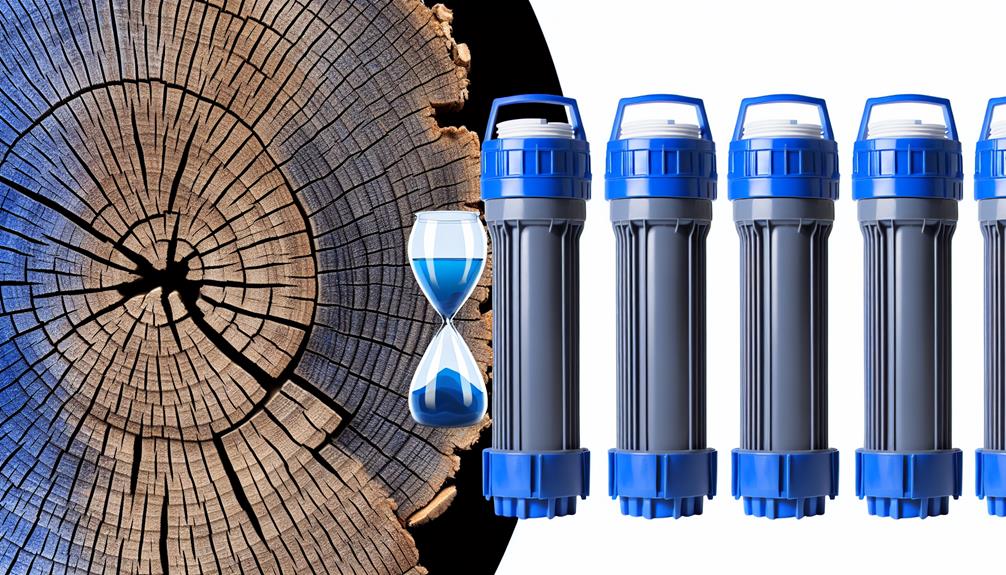You pride yourself on your pristine, purified water, but could your trusty water filter be secretly retiring without giving notice? You've been relying on it to safeguard your family from the unseen menaces lurking in your tap water, but like all good things, it too has an expiration date.
As you savor each sip, you might not realize that the effectiveness of your filter can diminish over time, potentially allowing contaminants to make their way into your glass. When was the last time you checked it? Don't just take a guess; it's essential to know the signs that your filter is waving the white flag.
Let's explore the indicators that it's time for a change, and consider how the very water you depend on could be subtly shifting in quality—after all, it's not just about taste and clarity, but your health could be on the line.
Recognizing Decreased Water Flow
If you notice that water trickles out of your faucet rather than gushes, this is a clear indicator of decreased water flow in your system. This could suggest that your water filter replacement is overdue. As filtered water passes through the filtration media, contaminants are trapped, and over time, this can lead to a filter that's clogged. This impediment restricts the flow, reducing the water pressure and diminishing the efficacy of your filtration system.
When you observe a decline in water pressure during showers, or if your appliances that utilize water are running with less vigor, it's a technical signal that your filters need attention. Audible anomalies such as gurgling sounds or air sputtering from your faucets are symptomatic of air pockets that often occur when decreased water flow is an issue, potentially pointing to a clogged filter. Similarly, if water flow is insufficient during routine activities like washing dishes or doing laundry, it's time to analyze and change the filters.
As a good rule of thumb, filters last a certain number of gallons or months, depending on usage and water quality; therefore, regular monitoring and timely water filter replacement are crucial for maintaining optimal performance of your filtration system.
Tasting and Smelling Changes
When your tap water begins to emit a foul or sewage-like odor, or you detect a sudden shift in its taste, it's likely indicative of a compromised water filter needing immediate evaluation. Water filters, especially those using activated carbon, are critical for maintaining the purity and water quality of your drinking water. However, over time, carbon filters reach a saturation point where they can no longer remove impurities effectively.
Here are signs that your filter needs attention:
- A noticeable change in water taste, potentially metallic or chemical.
- An off-putting smell from your tap, ranging from musty to sewage-like.
- The presence of an earthy or fishy odor in your water.
- A chlorine taste or smell, suggesting the filter isn't absorbing chemicals properly.
- Unusual flavors or odors that weren't previously detectable in your drinking water.
These tasting and smelling changes can signal that the expiration date of your filter is nearing or has passed. It's important not to ignore these cues. Replace your water filter as soon as you notice these changes to ensure the safety and palatability of your drinking water.
Regular monitoring and timely replacement are key to avoiding water contamination and potential health risks.
Visible Sediment and Turbidity
You'll notice your water's clarity compromised when visible sediment or a murky haze, known as turbidity, starts to appear, signaling that your filter may no longer be functioning optimally. Visible sediment—comprising dirt, sand, or rust—along with turbidity, disrupts the aesthetic and quality of your water. While sediment filters are engineered to trap these particles, ensuring peak performance necessitates periodic evaluation and replacement.
The accumulation of particles on sediment filters reduces their large surface area, crucial for capturing harmful contaminants like heavy metals. A decrease in surface area efficiency leads to diminished filter efficacy, allowing previously retained particles to enter your filtered water. Recognizing an uptick in visible sediment and turbidity is a clear indicator that your water filters are due for maintenance or replacement.
Analytically, it's essential to address high levels of visible sediment and turbidity promptly. Not only do they affect taste and appearance, but they can also harbor harmful contaminants that pose health risks. To maintain the integrity of your filtered water, heed these signs and replace your water filters as needed to ensure you're not exposed to undesirable impurities.
Water Filter Replacement Indicators
To maintain optimum water quality, it's crucial to heed the replacement indicators on your filtration system, which signal the appropriate time for filter maintenance or renewal. Recognizing when your filter needs to be replaced is fundamental to ensuring contaminants are effectively removed from your water supply.
Here are key water filter replacement indicators:
- End-of-Life Signal: Some advanced filters come equipped with end-of-life indicators that alert you when a filter change is necessary.
- Decreased Flow Rate: A noticeable reduction in water pressure often suggests a clogged filter, especially in systems with a large surface area like carbon filters.
- Taste and Odor: The return of unpleasant tastes and odors can indicate the carbon filter is saturated and no longer effective.
- Filter Longevity: If you've reached the manufacturer's suggested lifespan, typically between 6-12 months, it's time to replace the filter.
- TDS Level: For reverse osmosis systems, an increase in total dissolved solids (TDS) may reveal that the RO membrane is deteriorating.
Analyzing these indicators is key to maintaining an efficient system.
Filters are integral to the process to filter water, and their maintenance can't be overlooked. Always consult your product documentation for specific guidelines related to filter replacement intervals and methods.
Health Symptoms and Contaminants
While ensuring your water filter is replaced timely is essential, it's equally critical to recognize that certain health symptoms may stem from contaminants that filters are designed to remove. Gastrointestinal issues, skin rashes, and respiratory problems can be telltale signs that your tap water contains harmful elements. Water filters, such as a carbon filter, are designed to trap and remove these contaminants.
Filtration systems, including those from brands like Brita, aim to reduce the presence of bacteria, lead, and chlorine. However, no filter is foolproof. Over time, a filter's efficacy diminishes. Contaminants like pesticides, heavy metals, and total dissolved solids can accumulate, potentially leading to serious health conditions, including cancer and organ damage. Regularly testing your water and replacing filters can mitigate these risks.
It's imperative to understand the full capabilities of your water filtration systems. While some are adept at reducing metals and bacteria, others may not effectively handle dissolved solids. Always confirm that the filter you choose aligns with the specific contaminants present in your water.

